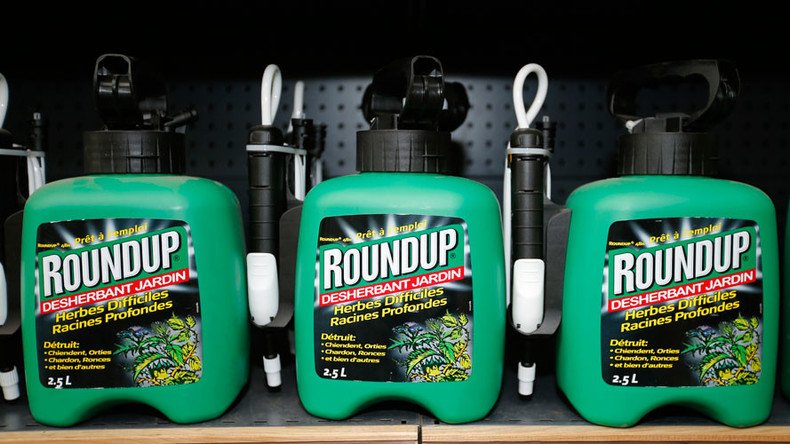Conflict of interest? Members of UN panel on glyphosate have Monsanto ties

Two people on the UN panel that just ruled the herbicide glyphosate “unlikely” to cause cancer in humans have ties to groups that have accepted over $1 million from Monsanto and another industry group representing agrochemical giants.
The people in question are Professor Alan Boobis, chairman of the UN panel investigating glyphosate – the active ingredient in Monsanto’s herbicide Roundup and other similar products – and Professor Angelo Moretto, the panel’s co-chair, the Guardian reported.
Boobis is the vice president of the International Life Science Institute (ILSI Europe). Moretto, meanwhile, is a board member of ILSI’s Health and Environmental Sciences Institute and of its Risk21 steering group. Notably, Boobis is a co-chair of Risk21.
ILSI Europe accepted a donation of $500,000 from Monsanto back in 2012, according to a document released by the US Right to Know campaign. The group also accepted donations from CropLife – which represents agriculture companies such as Monsanto, Dow, DuPont and Syngenta – totaling more than $528,000.
GMO crops not harming human health, but not boosting yields – reporthttps://t.co/UoNZHc2Bi0pic.twitter.com/cZaii1LUiP
— RT America (@RT_America) May 18, 2016
On Tuesday, the UN panel tasked with ruling on glyphosate – a joint effort between the Food and Agriculture Organization and the World Health Organization – said the herbicide is not likely to cause cancer in humans.
“In view of the absence of carcinogenic potential in rodents at human-relevant doses and the absence of genotoxicity by the oral route in mammals, and considering the epidemiological evidence from occupational exposures, the meeting concluded that glyphosate is unlikely to pose a carcinogenic risk to humans from exposure through the diet,” the panel said, as quoted by Reuters.
Revelations of industry ties have drawn strong criticism from many environmental and anti-genetically modified organism (GMO) groups, who have said the connections between the UN panel and ISLI place the entire study into doubt.
“There is a clear conflict of interest if the review of the safety of glyphosate is carried out by scientists who directly take money from industry and openly lobby for industry interests,” said Vito Buonsante of the environmental group ClientEarth.
Glyphosate and Atrazine: EPA posts, then retracts, reports on top herbicide chemicalshttps://t.co/lBb6RgvYR8pic.twitter.com/UFwkbE1l58
— RT America (@RT_America) May 6, 2016
The non-governmental environmental organization Greenpeace also questioned the UN panel ruling in a statement, saying ISLI and its Health and Environmental gets most of its funding from private companies, including glyphosate producers.
Greenpeace also said that most of the scientists involved in a European Food Safety Authority study on glyphosate refused to be named. The EFSA is soon expected to vote on whether to re-license glyphosate, and anti-pesticide groups argue that the timing of the UN panel report is suspicious.
“The agencies contradicting the WHO cancer warning seem to either rely on officials who prefer not to be named, or lack a watertight policy to protect their impartiality,” Greenpeace EU food policy director Franziska Achterberg said.
“Any decision affecting millions of people should be based on fully transparent and independent science that isn’t tied to corporate interests. It would be irresponsible to ignore the warnings on glyphosate and to re-licence this pesticide without any restrictions to protect the public and the environment.”
Groups such as Greenpeace have also come out strongly against the glyphosate ruling because of a previous report from the WHO’s International Agency for Research on Cancer (IARC), which said the chemical can “probably” cause cancer in humans. The WHO has denied that the studies contradict each other, arguing that the first one analyzed glyphosate as a potential hazard while the second looked at it as a risk.
“IARC reviews published studies to identify potential cancer hazards,” the WHO said, according to Reuters. “It does not estimate the level of risk to the population associated with exposure to the hazard.”
Meanwhile, Boobis has dismissed allegations of a conflict of interest.
“My role in ILSI (and two of its branches) is as a public sector member and chair of their boards of trustees, positions which are not remunerated,” he told the Guardian. “The boards of trustees are responsible for oversight of the organisations and their scientific programmes.”
Moretto has not commented on the issue.













